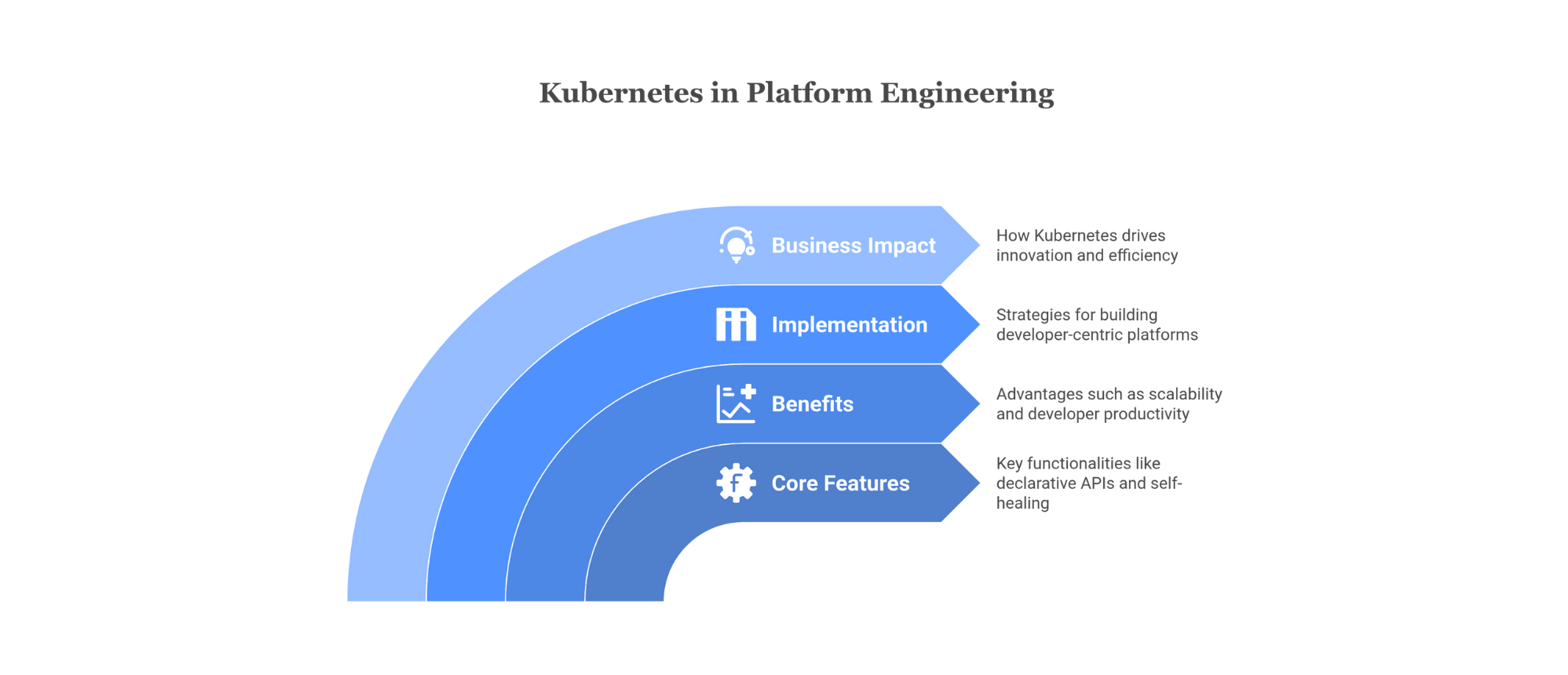How Kubernetes Accelerates Platform Engineering Maturity

Intoduction
Kubernetes is foundational to modern platform engineering, delivering a paradigm shift in how applications are developed, deployed, and managed at scale. However, beyond the common narrative of Kubernetes as just a container orchestrator lies a deeper opportunity for platform engineering teams to revolutionize developer experience, operational excellence, and business agility.

How Kubernetes Works in Platform Engineering
Kubernetes orchestrates containerized applications by automating deployment, scaling, and management across clusters of machines. Containers package applications with their dependencies, ensuring consistency and portability from development to production environments. In platform engineering, Kubernetes is not just about running containers but about creating an internal self-service platform that abstracts underlying infrastructure complexities for developers. This is achieved by integrating CI/CD pipelines, Infrastructure as Code (IaC), monitoring, and security controls into a cohesive platform experience.
- Kubernetes serves as the foundational layer that abstracts underlying infrastructure complexities.
- Platform engineers use Kubernetes to provide consistent application runtimes across on-premises, hybrid, and multi-cloud environments.
- Continuous integration and delivery (CI/CD) pipelines integrate with Kubernetes to automate build, test, and deployment workflows.
- Infrastructure-as-Code (IaC) tools such as Terraform or Pulumi manage Kubernetes infrastructure declaratively.
- Observability and monitoring tools embedded in Kubernetes platforms provide proactive insights for reliability and performance.
Core Features Distinguishing Kubernetes in Platform Engineering
-
Declarative APIs and GitOps: Infrastructure and application deployment are defined as code, fostering version control, auditability, and collaboration.
-
Self-healing and Auto-scaling: Kubernetes automatically recovers failed containers and scales workloads based on demand, optimizing resource utilization.
-
Service Discovery and Load Balancing: Internal services are dynamically discovered, and traffic is distributed to maintain reliability and performance.
-
Extensibility and Ecosystem: Kubernetes allows integration of diverse CNCF tools (CI/CD, monitoring, security, storage) into a unified platform.
-
Multi-cloud and Hybrid-cloud Support: Kubernetes enables consistent application runtime across various environments, critical for modern platforms.
Benefits of Kubernetes in Platform Engineering
- Scalability and Elasticity: Seamless horizontal scaling and auto-scaling to match workload demands.
- Developer Productivity: Self-service platforms and the abstraction of infrastructure allow developers to focus on code.
- Resilience: Automatic healing and rollback capabilities ensure high availability.
- Flexibility: Supports diverse workloads including stateless services, stateful applications, and batch jobs.
- Consistency: Uniform environment across development, testing, and production.
- Cost Optimization: Efficient resource utilization through resource requests and limits, leading to reduced infrastructure costs.
Implementing Kubernetes-Based Platform Engineering:
What sets a transformative platform engineering implementation apart is the focus on composability and developer-centric design, instead of merely deploying Kubernetes clusters, a composable architecture that breaks platform functionality into modular, reusable components. This modularity allows rapid iteration, testing, and customization per client demands, which is rarely emphasized in traditional platforms.
- Designing Internal Developer Platforms (IDPs) where developers interact via simple APIs, abstracting Kubernetes complexities.
- Building automated CI/CD pipelines with tools like Tekton or Argo CD integrated with Kubernetes.
- Managing infrastructure through IaC, ensuring version control, repeatability, and auditability.
- Integrating observability with Prometheus, Grafana, and logging stacks to maintain health and optimize performance.
- Enforcing security policies and access control using Kubernetes RBAC, network policies, and Pod security standards.
- Enabling scalability and resilience by adopting autoscaling, load balancing, and self-healing mechanisms.
Why Kubernetes Matters for Modern Enterprises
The unique power of Kubernetes in platform engineering lies in transforming raw technology into an enabler of business innovation with minimized friction. Its ability to decouple application development from infrastructure constraints accelerates time-to-market and improves software quality. Orchestration with containerization gives enterprises unmatched flexibility in workload deployment, making multi-cloud and hybrid strategies achievable realities.
Conclusion
Kubernetes forms the backbone of modern platform engineering, embodying a distinct approach that prioritizes developer experience, automation, and resilience. Their power lies in enabling organizations to build scalable, flexible, and efficient infrastructure platforms while reducing operational complexity.
